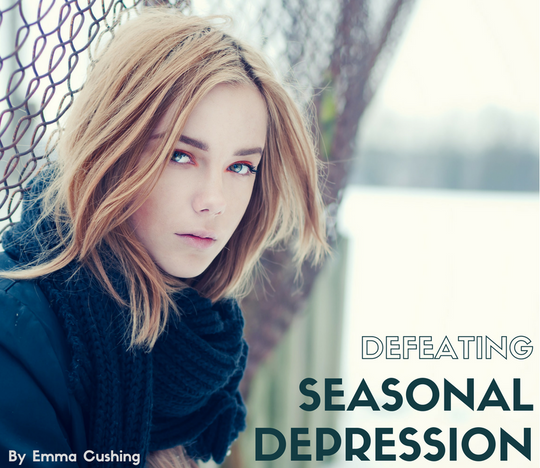Defeating Seasonal Depression
Posted on March 08 2017,


What is it? If you’re living in New England, chances are you’ve heard of Seasonal Affective Disorder (aptly abbreviated to SAD and otherwise known as seasonal depression). For those of you not in the American Northeast, what sounds like a goofy or trivial issue is actually a serious clinical condition that can alter half a person’s year this far north. Unlike other forms of depression, the seasonal variety can sometimes be staved off by informed and preemptive at-home measures.
What does it look like? SAD is a form of depression, which is characterized generally by things like low energy and loss of interest in the things a person usually likes to do, as well as lethargy, changes in sleeping and eating patterns, and/or having trouble concentrating. Additionally, a person experiencing SAD may be prone to irritability, hypersensitivity, low self-esteem, tearfulness, lowered sex drive, and social withdrawal. And like all depression, if it goes untreated, it can also cause suicidal ideation – if this occurs, call a doctor immediately.
What causes it? One of the main triggers for SAD is the reduced daylight hours in the winter months. Sunlight is essential for the production of serotonin, an important neurotransmitter that helps regulate mood. Vitamin D is another big player in staying a happy human, and that’s largely taken in by exposing the skin to sunlight. Lack of sunshine also creates an increase in the production of melatonin, a sleep hormone, which can up the chances of feeling sluggish and cranky even with a full night of sleep — like a child who skipped nap time for an entire season.
What can prevent it? So, what can you do if you feel the winter blues coming to call? Here are some pro tips for preventing, managing, and remedying SAD:
- First and foremost, if you know you’re prone to seasonal depression, take some of these steps before it sets in. Plan ahead – it’s much harder to do anything when you’re already bummed out.
- Invest in a light box to reduce the effects of shorter days. Sit with it while you eat your breakfast in the morning. If you can and it isn’t too cold, try to be conscious of spending more of the reduced winter daylight hours in or near sunshine.
- Check your diet! Avoid sugar and other fast-flare burners, and limit your caffeine intake – it suppresses serotonin. Instead, try to be sure to get plenty of omega-3s, protein and brightly colored veggies. Various whole grains, fruits, nuts, and peanut butter should be your pantry go-tos, with cottage cheese, eggs, and low-sugar deli meats as fridge snacks. Be sure to eat more foods naturally or additively fortified with vitamin D, and/or ask your doctor about vitamin D supplements.
- Exercise. It doesn’t have to be a lot, as long as it’s consistent. Even ten minutes a day is infinitely better for your mood than zero minutes a day, or thirty minutes every three to five days. Morning yoga is a great way to get that done! Energize and empower yourself by greeting the dawn with some sun salutes before it comes up every morning.
- Check out aromatherapy or scented candles to help you in areas where you’re suffering the most, like scents that bring you comfort or alertness.
- Create a schedule for your day, every day. Having a clearly defined set of realistic daily goals can help you feel accomplished and motivated instead of like you’re slogging through a long week/winter.
- Hydrate! Making sure you’re drinking enough water only ever makes things better, and it’s so easy to do.
- Get in the habit of keeping a gratitude journal or meditating at a certain time every day. Staying centered and present can help mitigate the more overwhelming sensations of seasonal depression.
- Make the time and the effort to do the things you like to do; if you find that you’ve stop doing those things even when you have time, talk to your doctor.
- Get involved! Be an active part of your community: talk to friends, volunteer even an hour a week at a soup kitchen or animal shelter, go to the local library or coffee shop or bookstore or yoga studio on a regular basis, etc.! There are lots of fun and creative ways to make yourself a part of something bigger.
- This may sound simple, but be extra careful to make sure your basic needs are being met. Self-care and being kind to yourself cannot be overstated when you’re in an emotionally tumultuous time; if possible, remove yourself from the presence of anybody who says otherwise.
- For more ideas on how to organically boost your mood, see our Color Your Mood post! Yet another reason brightly colored yoga mats are good and good for you.
- Call your doctor if you feel hopeless, worthless, profoundly fatigued, or suicidal. Again, SAD is a form of depression, so talk to your doctor and loved ones about how you’re feeling. If you’re not sure how, check out resources like National Alliance on Mental Health at http://www.nami.org/ to get started.
Seasonal depression can be a big bummer, but following these tips can help you nip it in the bud! Leave us a comment with your favorite winter mood-booster!

0 comments